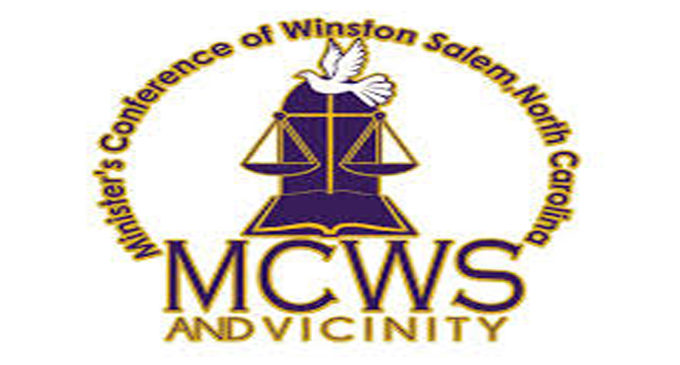Local law enforcement discuss recent demonstrations, internal “No Snitching” rule

In the midst of calls for police reform and defunding law enforcement agencies across the country, earlier this week the Ministers’ Conference of Winston-Salem and Vicinity invited assistant police chiefs William Penn and Natasha Miles, and Sheriff Bobby Kimbrough to participate in a virtual town hall.
During the virtual town hall held on Tuesday, June 23, Penn, Miles and Kimbrough discussed the peaceful demonstrations held here in Winston-Salem, law enforcement training and policies, and several other topics including the “No Snitching” policy among law enforcement.
One of the hardest hitting questions during the town hall came from Bishop Todd Fulton, pastor of Mt. Moriah Outreach Center and chair of the Ministers’ Social Justice Committee. He said while he has a working relationship with local law enforcement agencies, there is concern about the silence of police officers when it comes to calling foul play within the force.
Fulton mentioned an effort last year by the Winston-Salem Police Department that called for the end of the “No Snitching” policy throughout the community to help bring a close to several unsolved murders. He said, “The same way we went on television and asked the community not to subscribe to the no snitch policy and the no snitch code in the African American community, we’re asking the sheriffs and police officers to speak to their officers about the no snitch policy among officers.”
In response, Kimbrough and Miles briefly discussed their “Duty to Intervene” policies. According to Kimbrough, the policy means if any officer sees wrongdoing and doesn’t report it, they could be in jeopardy of losing their jobs. Miles said when she was in rookie school, she was told that it was her responsibility to intervene and it’s something the department still practices today.
“I was told it was my responsibility to intervene when I saw something wrong and I’ve remained committed to that,” she continued. “And that was in 1993 and to this day, we still instill the same values in our recruits that we did almost 30 years ago and more. So they do hear the message.”
Miles also mentioned that the WSPD has a reporting system where officers are reporting incidents. Chief Penn mentioned that Chief Thompson has met with every officer and employee about the Duty to Intervene and the “8 Can’t Wait,” list of recommendations. She said the WSPD update their policies regularly to incorporate the best practices.
Since he was elected to serve the citizens of Forsyth County in 2018, Kimbrough said he has been big on training. He said in addition to the required training, he has brought in some of the best professionals in the country to conduct training on cultural diversity, self awareness, and racial equity. Prior to 2018, the Sheriff’s office didn’t offer racial equity training.
Kimbrough also mentioned instead of annually, the FSCO conducts training quarterly. He said training is something that should be ongoing. “This once a year … all that is to me is a seminar training, it has to be an ongoing continuous thing,” Kimbrough said.
When discussing recent demonstrations held downtown and in other parts of the city, Kimbrough applauded community leaders for keeping demonstrations peaceful. He also praised local leaders for leading the push for Executive Order 145, legislation signed into law by Governor Roy Cooper that establishes the Racial Equity in Criminal Justice Task Force, and encouraged everyone to speak out against injustice and for policy change.
“As most of you saw, Executive Order 145, the Task Force on Racial Equality and Criminal Justice, that was spearheaded out of this county,” Kimbrough continued. “It’s the leadership that everybody in this county is giving that is making a difference … but we’ve got to continue what we’re doing … all of us have to lift our voices.”
According to Kimbrough, Executive Order 145 put more accountability on officers. He said under the new policy, call complaints against officers will go to the Attorney General. He said the policy will ensure internal complaints aren’t fabricated.
Penn said other communities are calling and asking how they’ve been able to keep protests peaceful. He gave the credit to the community for keeping things peaceful.
“Credit goes to the community and leaders within the community,” Penn said. “As for the agency, we like to pride ourselves on being an empathetic department; therefore when the demonstrations took place, we wanted to immediately show ourselves to be the guardians as opposed to warriors. We’ve been out in the community walking with demonstrators, speaking with the demonstrators, and allowing them to let their voices be heard.”
Following the town hall, Pastor Tembila Covington, president of the Ministers’ Conference, thanked Miles, Penn, and Kimbrough for participating. She said the candid conversation shows that the community and local law enforcement have a working relationship.
“We are very appreciative and I believe this shows clearly that there is relationships between our community leaders, our pastors, and lay members with our law enforcement and we continue to work at it to ensure that we have clear understanding and know what is going forth for the good of our citizens here in Forsyth County and in Winston-Salem.”











